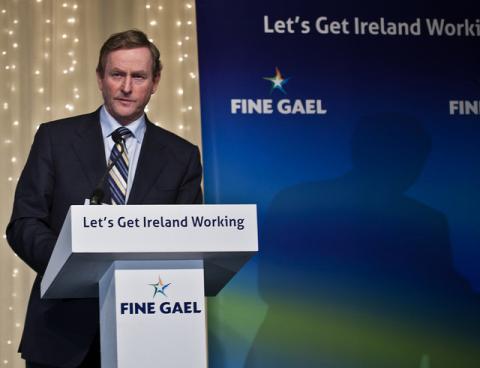Fine Gael's ideological agenda

Although Fine Gael work hard to give the impression that they are simple pragmatists, the party is in fact a highly ideological one. By Vincent Browne.
With the world financial system on the verge of collapse, the imposition of unsustainable debt on this society because of the crisis in the banks, and the threat to our economic sustenance from the Franco-German push to harmonise corporation tax across the EU, the last thing we need right now is ideology, isn’t it?
Headwrecking, nit-picking arguments about ‘isms’ and political spectrums and all that blather that the hard-left pinkos go on about.
It is reassuring, then, to learn from a new book on Fine Gael, Enda Kenny and how this new government came into being - The Road to Power: How Fine Gael Made History by Kevin Rafter - that Kenny is not a bit ideological. And neither is Fine Gael.
This was part of the 2011 election plan devised by Fine Gael backroom types with two front room types - Phil Hogan and Frances Fitzgerald - thrown in, last September.
They predicted that Kenny’s lack of ideological baggage should be a feature of the campaign and, by God, it worked.
Last September was a bad time for Kenny. The opinion polls were saying he was a loser.
On September 29, the headline results of the latest opinion poll were sent by text to Kenny in the middle of a parliamentary party meeting.
They conveyed a disastrous message: Labour was at 34 per cent, and Fine Gael and Fianna Fáil were back at 24 per cent.
There were renewed murmurings of another heave against Kenny.
The plan was to settle all that. The book says Kenny had shown no interest in ideological debates. ‘‘His ambitions were aspirational, which left room for pragmatic decision making: to change Ireland for the better.”
The plan all along had been, according to the book, to make Fine Gael into a version of Fianna Fáil, ‘‘combining the best parts of Fianna Fáil populism with a rejuvenated expression of the great ideals which Fine Gael stands for’’.
The great ideals for which Fine Gael stands for were not disclosed.
The whole focus was on winning power. An earlier report, written by some of the same people, had stated that ‘‘the only coinage any political party has at the end of the day is how many votes it gets’’.
The September 2010 report went on to outline the strategy to be followed in the following months: all criticisms of the party were to be met by attack; Fine Gael was to be passionate about change; there were to be no mixed messages; and a strategy was devised to clobber Labour, branding it a high tax party, as all things to all people, as policy-lite.
The five-point plan was devised following market research, designed to hit the trigger points of public opinion: 20,000 new jobs a year and an investment of €7 billion in new infrastructure in broadband, green energy and water networks; fixing the budget deficit by cutting waste and a promise of no increase in income tax; the elimination of hospital waiting lists and the two-tier health system; smaller, better government and the saving of €5 billion by eliminating 145 quangos; and political reform.
Since the party got into government, there has been more pragmatism - and yet more to come with the promise of third-level fees, social welfare ‘reform’, labour market ‘reform’ and a Vat increase.
The problem with all this pragmatism is that it is deeply ideological, whatever the practitioners of pragmatism think or wish it to be. All of it involves choices - an obvious one being to resolve not to increase income tax, by promising to increase Vat.
And this is very ideological.
An ESRI report on the effects of Vat across Irish society, published last month, said:
‘‘The current rates, as well as the rates [of Vat] that were in place in 2009, give rise to a system which is highly regressive.
Even when we simulate various rate changes such as the abolition of Vat on food or children’s clothing, households in the lowest income decile [ie, the least well off 10%] still pay the highest proportion of disposable income in Vat’’.
The decision to exempt from increase the tax that is most progressive (ie hitting the wealthy the most) and to increase the tax that is the most regressive (ie hitting the poorest the most) is classically ideological.
The decision to ravage the educational and health systems does the same, as the better-off can afford private education and private healthcare and it hardly matters to them what happens to the public health and education systems.
Kenny genuinely wants to change Ireland for ‘‘the better’’, as did Bertie Ahern and all his predecessors. But what would be ‘‘better’? Kenny has done well by appearing to be ideology lite, while actually being ideologically overweight.
That is luck; I hope to deal with Kenny’s luck and how so many of us underestimated him next week.
Image top: infomatique.
